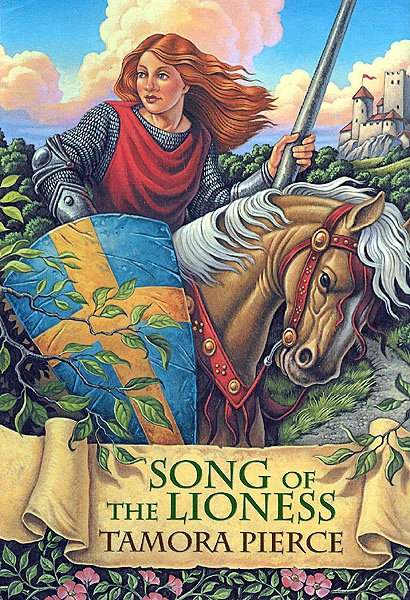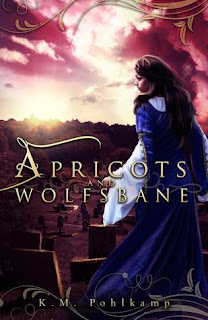1.3 Review: The Song of the Lioness

Enthusiastic Review: Tamora Pierce’s The Lioness Quartet series.
I'm starting my reviews today with an author whom I have followed for over 10 years. Because writing, especially good writing, stays with you.
Before I begin, I should start with a caveat:
I read these novels when I was sixteen originally
and when I look back on them now, I find that what made me like them
then still very much hold up as an adult. However, as well you might
expect, I have the rose-tinted glasses of youthful
adventure over these novels.
Many folk who are now YA readers probably weren’t
born before the age of ADSL internet and PDF downloads from Amazon. I
was. In my day, I journeyed to bookstores and libraries for my meals of
novel-oodles. We were hungry to find books on
shelves; genres were restricted and rare and popular novels as a poor
student with no income could take weeks to be available for check-out at
the local library. Yes, these were dark times indeed for hungry
readers. We ate pages of whatever we could get our
paws on, begging parents for trips to the ‘big stores’ and the next
novel from our favourite author. Reading was a hunter-gatherer society.
There was a lot of vicious victory to successfully getting each book of a series, being able to read them all, and in order.
Now, a second caveat:
I have read a lot of YA. I have read a lot of
fantasy, a lot of urban/paranormal and plenty of science fiction. But
most of it I haven’t liked. A lot of reading, like watching a lot of
anime, has refined my tastes a lot. I am a reading
snob.
To begin, I’ll start with what made these novels unique.
From very early on, the Lioness and the other four
series set in this same universe, were clearly well researched, well
crafted and anchored in good literary grounding.
Characters
Characters were not one-dimensional. The heroes
made mistakes, the villains didn’t twirl their mustaches and cackle
dramatically. Secondary characters felt like they existed when the main
characters left the room and not everything revolved
around one person.
This is a big appeal to me, and I think the Lioness
series may have been the first time I ever saw it happen properly.
Girls didn’t spend all their time sobbing over boys liking them,
characters with dark pasts were able to function in-spite-of
angsting and I was shocked.
The women could wear armor that wasn’t bikini mail,
being good at something required characters to train, for years, with
hard-work and effort. People won a fight because they were skilled
warriors, used tactics and had something to lose.
Setting
Pierce didn’t spend pages and pages describing the
ocean cliff leading to the castle’s shimmering towers. But I never once
failed to keep an image of the location, the people, the world in my
head because short, simple but well worded descriptions
kept the imagery alive and painted vivid pictures in my head.
The world had one of the first goddess pantheon
religions I’d ever seen in print- and it was well done. Nothing preachy;
it just so happened in this fantasy world that they had this type of
religion. No mass religious debates, no preaching.
Subtle, simple. At the end of the day, that worked really well.
Plot
On the surface, the lioness quartet seems very
thin- a girl pretends to be a boy in order to become a knight in a time
when girl’s aren’t allowed to do that. But that is only a tiny amount of
the premise; the stories involve small personal
victories; eventually adding up to logical, solid, sustainable social
changes; conflicts and resolutions.
I won’t say much about the plot, because so many
reviews just ruin the joy of discovering the twists and turns yourself.
The plot of the Lioness quartet is nuanced. Like any good novel, each
part of the series has layers of narrative.
One of the things that works so well in the world that Pierce built is that personal victories are what these novels are about. There isn't a race to save the world every single novel- she works up to that. This is a technique so many novels fail to understand; if you are saving the universe every day it becomes mundane and ho-hum. People start finding it a little same-y. Instead the characters achieve much more realistic and satisfying goals; standing up to a bully and winning- or changing their world. Obtaining something you have been working toward for years. These are goals that you can really relate to in the real world. Courage isn't just about throwing yourself in front of the villain; sometimes its about the hard work to finish learning to drive.


Comments
Post a Comment